HND Business Law: English Legal System Presentation - LO1
VerifiedAdded on 2023/01/13
|14
|1155
|21
Presentation
AI Summary
This presentation, prepared for Concern Solicitors, offers a comprehensive overview of the English Legal System for new business organizations. It begins by outlining the various sources of UK law, including case law (common law and equity), legislation, EU law, international conventions and treaties, and the role of authorities and writers. The presentation then delves into the role of government, exploring the functions of the Monarchy, Executive, Legislature, and Judiciary. The law-making process is explained in detail, from the decision to legislate through the stages a bill must pass to become law, including parliamentary stages and Royal Assent. Finally, the presentation discusses the application of statutory and common law in UK justice courts. This presentation serves as a valuable resource for understanding the fundamental aspects of the English Legal System.
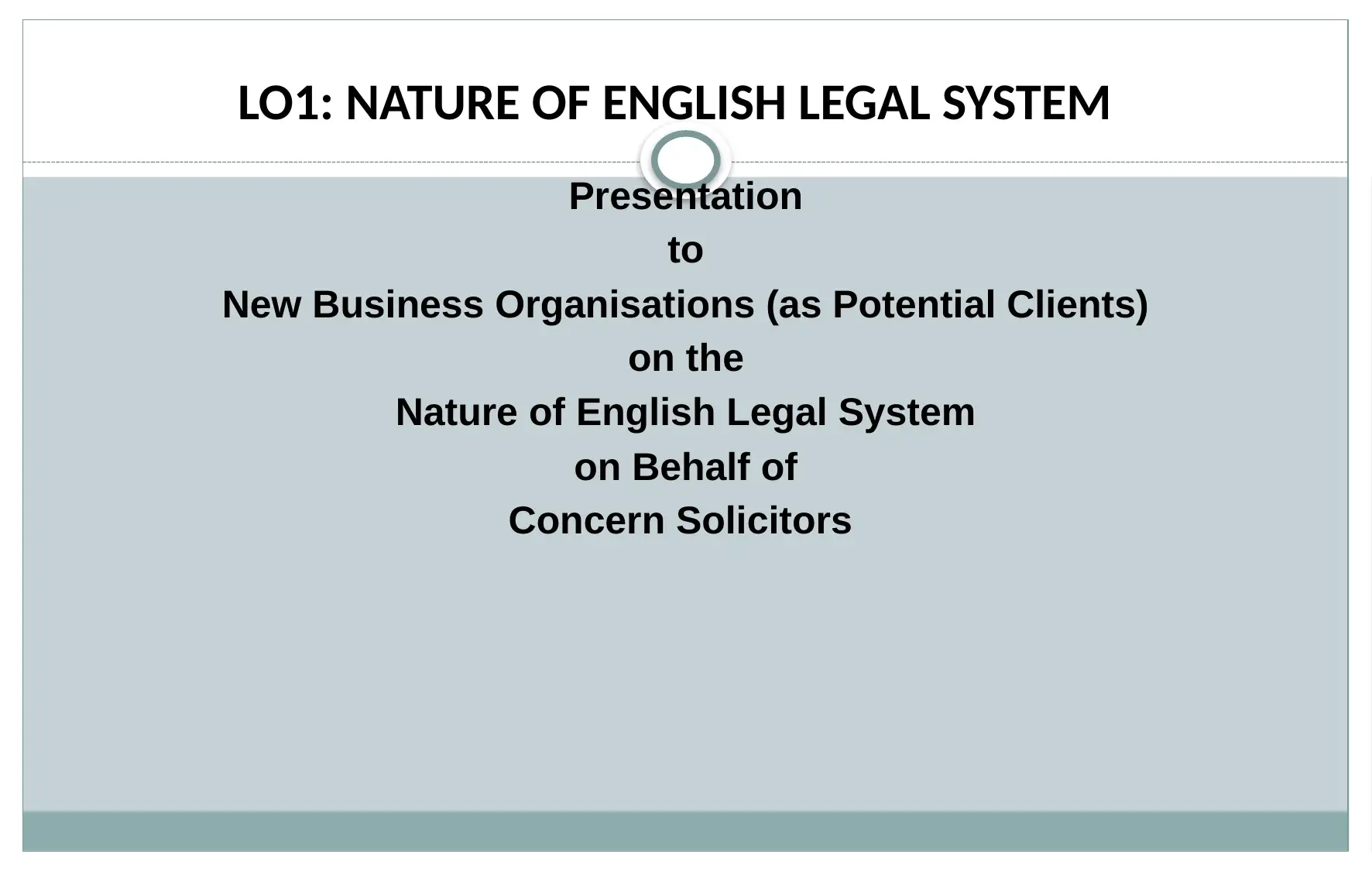
LO1: NATURE OF ENGLISH LEGAL SYSTEM
Presentation
to
New Business Organisations (as Potential Clients)
on the
Nature of English Legal System
on Behalf of
Concern Solicitors
Presentation
to
New Business Organisations (as Potential Clients)
on the
Nature of English Legal System
on Behalf of
Concern Solicitors
Paraphrase This Document
Need a fresh take? Get an instant paraphrase of this document with our AI Paraphraser
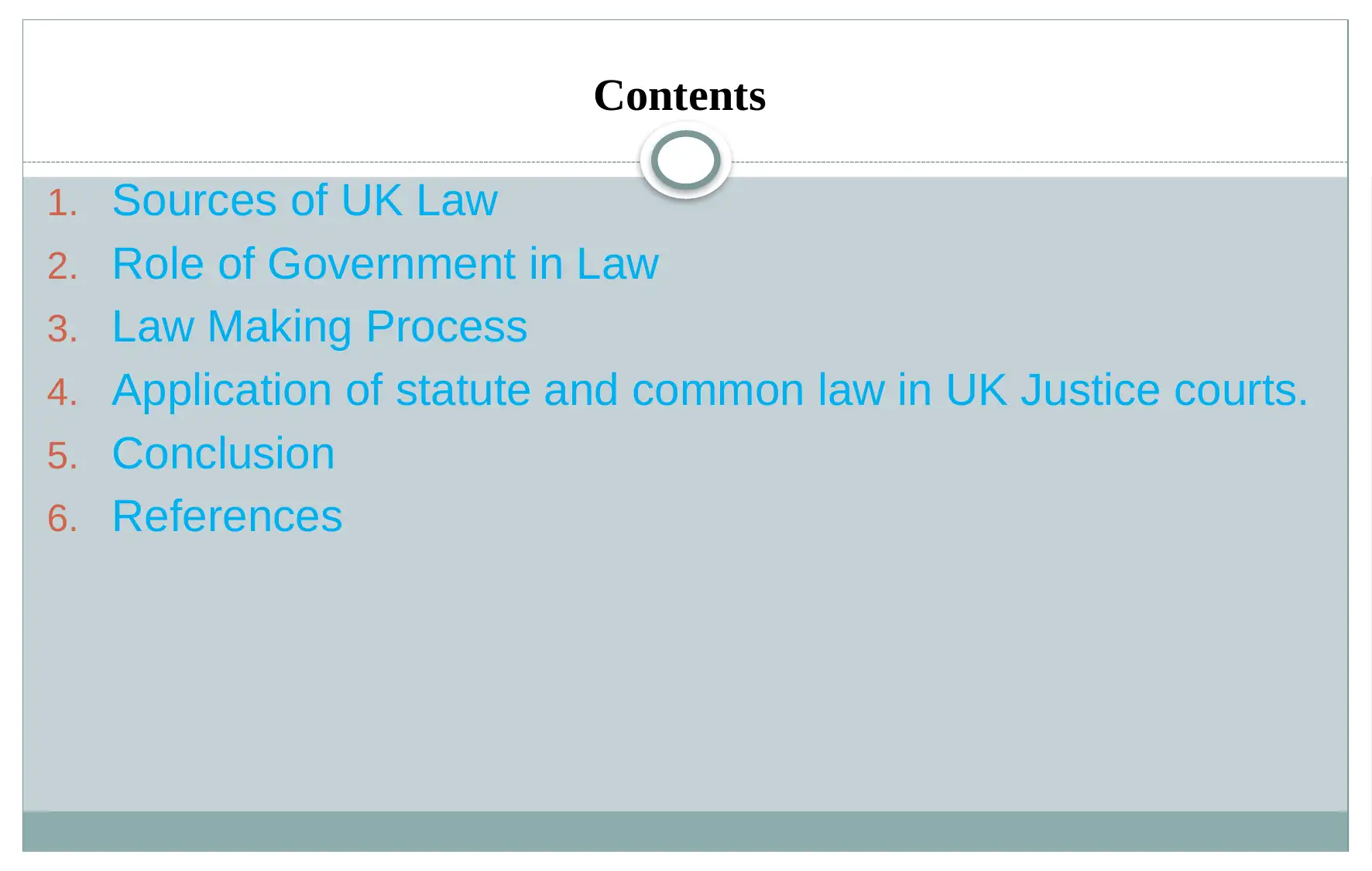
Contents
1. Sources of UK Law
2. Role of Government in Law
3. Law Making Process
4. Application of statute and common law in UK Justice courts.
5. Conclusion
6. References
1. Sources of UK Law
2. Role of Government in Law
3. Law Making Process
4. Application of statute and common law in UK Justice courts.
5. Conclusion
6. References
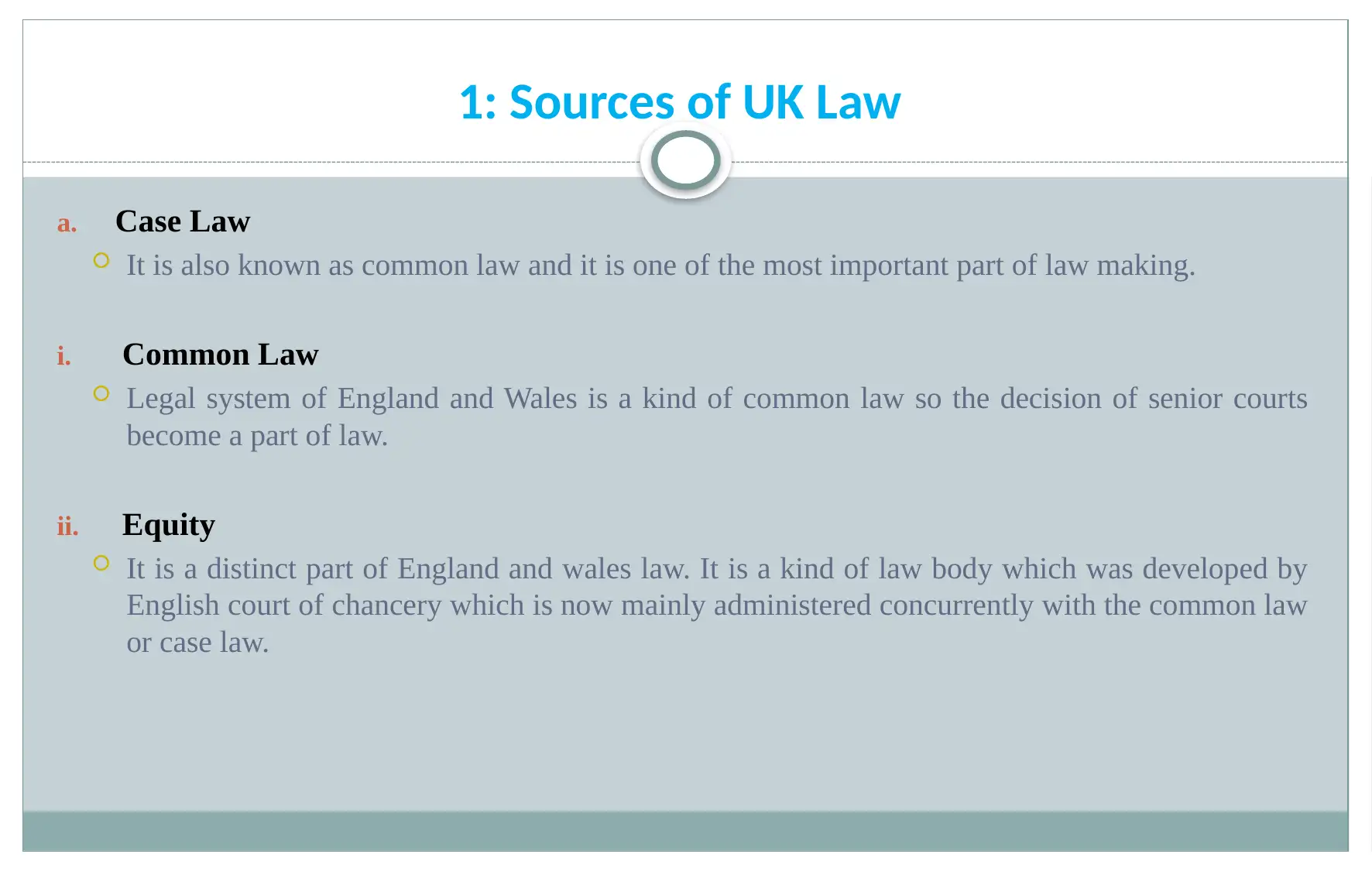
1: Sources of UK Law
a. Case Law
It is also known as common law and it is one of the most important part of law making.
i. Common Law
Legal system of England and Wales is a kind of common law so the decision of senior courts
become a part of law.
ii. Equity
It is a distinct part of England and wales law. It is a kind of law body which was developed by
English court of chancery which is now mainly administered concurrently with the common law
or case law.
a. Case Law
It is also known as common law and it is one of the most important part of law making.
i. Common Law
Legal system of England and Wales is a kind of common law so the decision of senior courts
become a part of law.
ii. Equity
It is a distinct part of England and wales law. It is a kind of law body which was developed by
English court of chancery which is now mainly administered concurrently with the common law
or case law.
⊘ This is a preview!⊘
Do you want full access?
Subscribe today to unlock all pages.

Trusted by 1+ million students worldwide
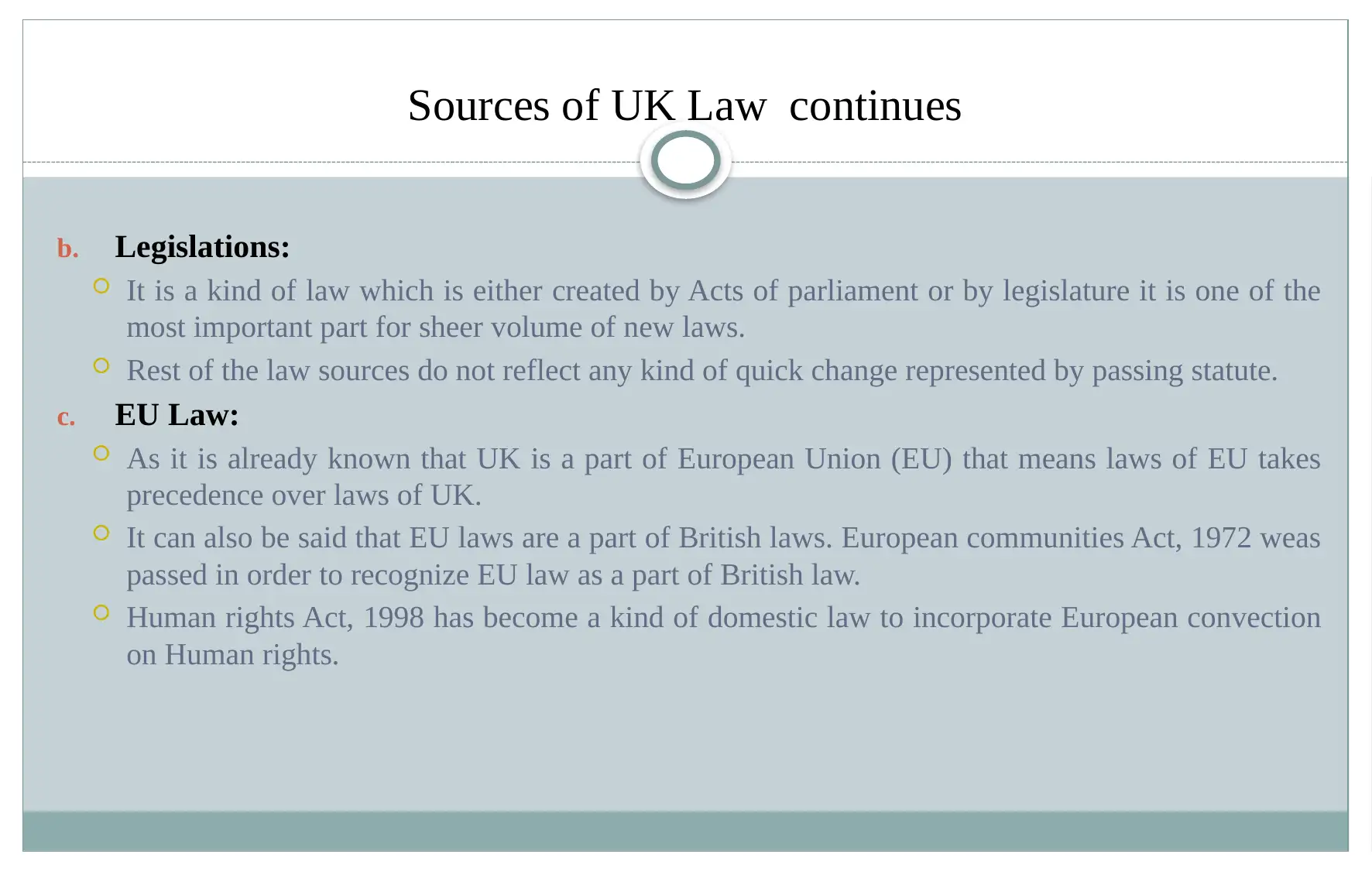
Sources of UK Law continues
b. Legislations:
It is a kind of law which is either created by Acts of parliament or by legislature it is one of the
most important part for sheer volume of new laws.
Rest of the law sources do not reflect any kind of quick change represented by passing statute.
c. EU Law:
As it is already known that UK is a part of European Union (EU) that means laws of EU takes
precedence over laws of UK.
It can also be said that EU laws are a part of British laws. European communities Act, 1972 weas
passed in order to recognize EU law as a part of British law.
Human rights Act, 1998 has become a kind of domestic law to incorporate European convection
on Human rights.
b. Legislations:
It is a kind of law which is either created by Acts of parliament or by legislature it is one of the
most important part for sheer volume of new laws.
Rest of the law sources do not reflect any kind of quick change represented by passing statute.
c. EU Law:
As it is already known that UK is a part of European Union (EU) that means laws of EU takes
precedence over laws of UK.
It can also be said that EU laws are a part of British laws. European communities Act, 1972 weas
passed in order to recognize EU law as a part of British law.
Human rights Act, 1998 has become a kind of domestic law to incorporate European convection
on Human rights.
Paraphrase This Document
Need a fresh take? Get an instant paraphrase of this document with our AI Paraphraser
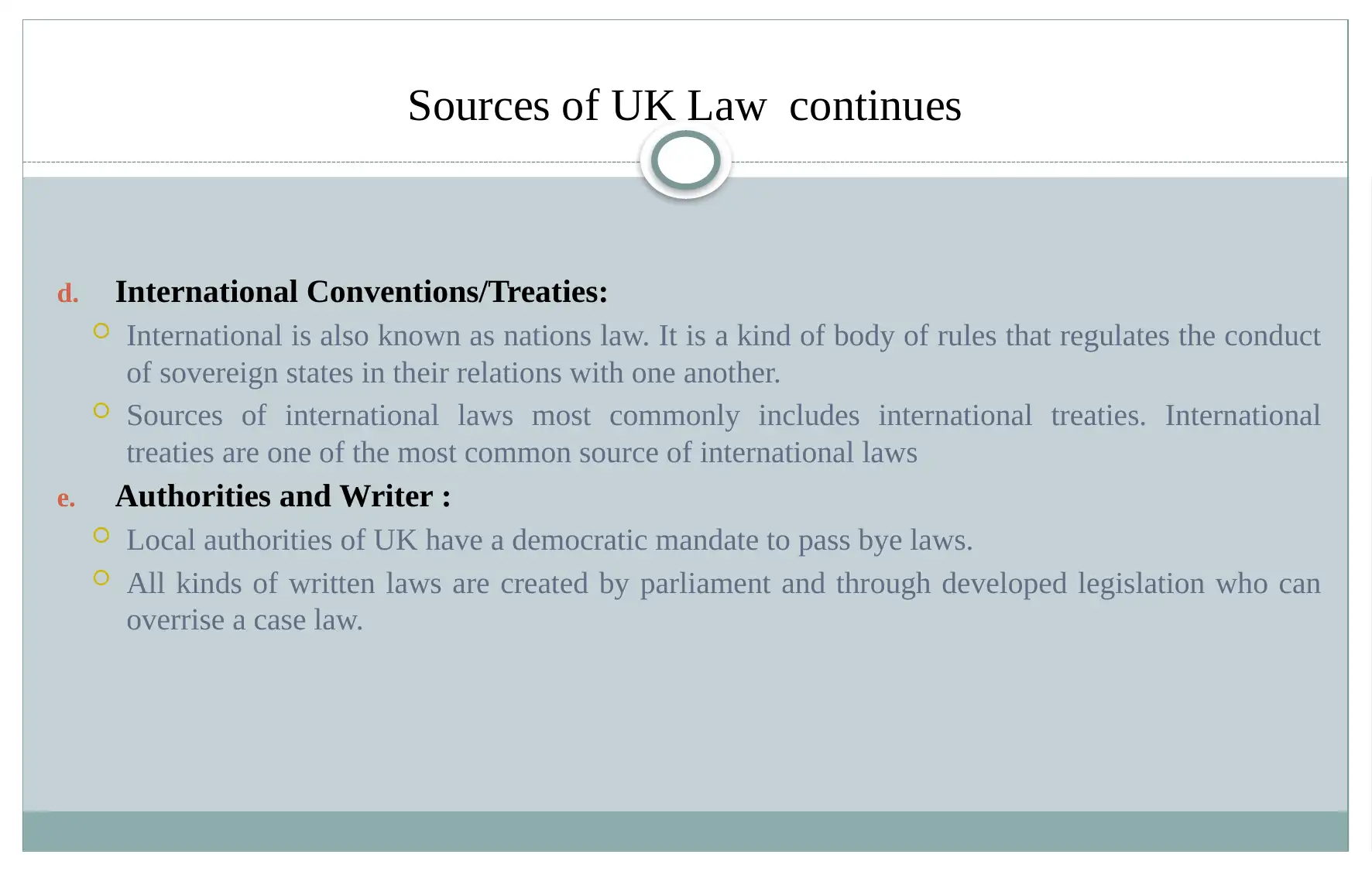
Sources of UK Law continues
d. International Conventions/Treaties:
International is also known as nations law. It is a kind of body of rules that regulates the conduct
of sovereign states in their relations with one another.
Sources of international laws most commonly includes international treaties. International
treaties are one of the most common source of international laws
e. Authorities and Writer :
Local authorities of UK have a democratic mandate to pass bye laws.
All kinds of written laws are created by parliament and through developed legislation who can
overrise a case law.
d. International Conventions/Treaties:
International is also known as nations law. It is a kind of body of rules that regulates the conduct
of sovereign states in their relations with one another.
Sources of international laws most commonly includes international treaties. International
treaties are one of the most common source of international laws
e. Authorities and Writer :
Local authorities of UK have a democratic mandate to pass bye laws.
All kinds of written laws are created by parliament and through developed legislation who can
overrise a case law.
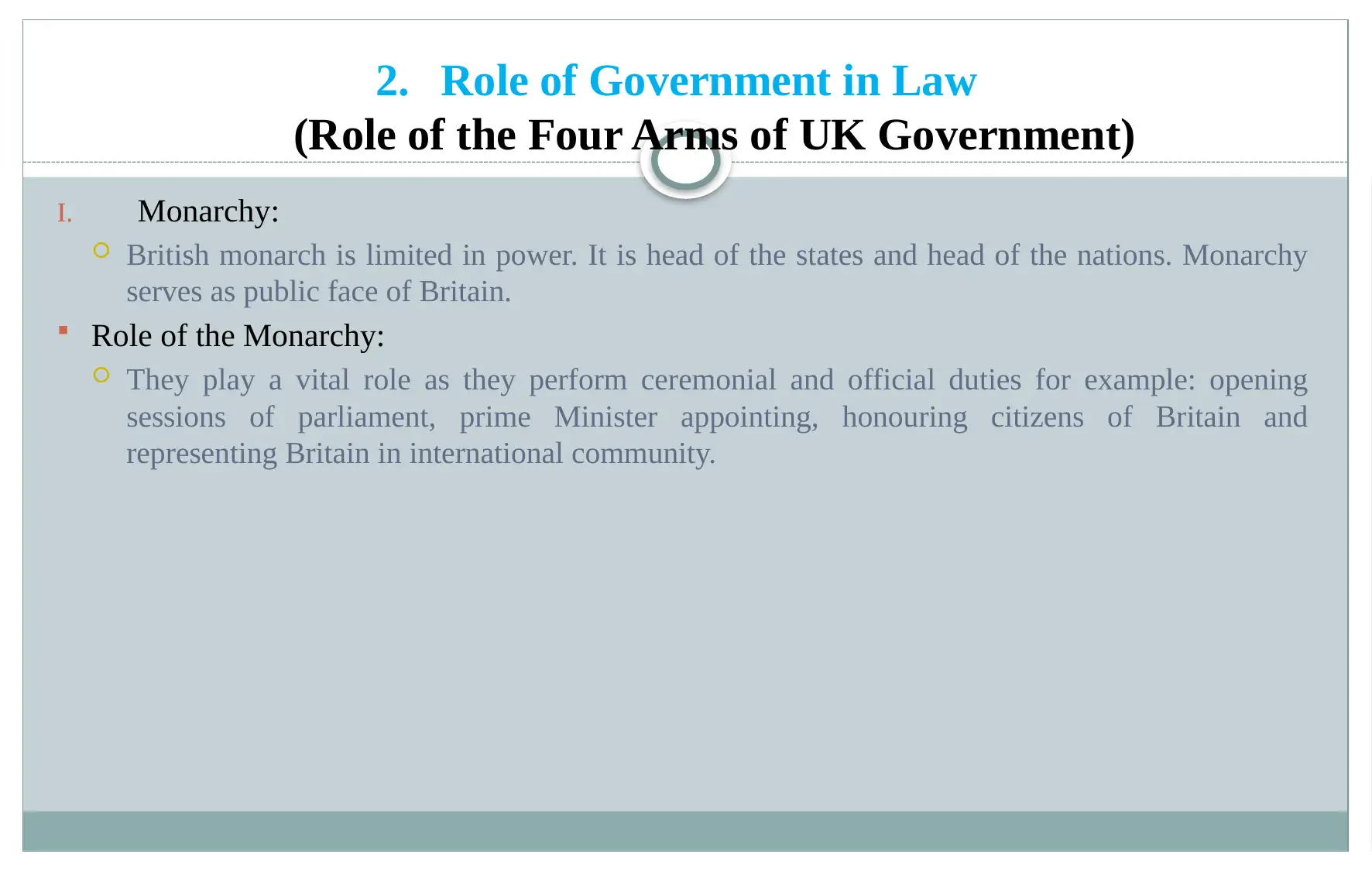
2. Role of Government in Law
(Role of the Four Arms of UK Government)
I. Monarchy:
British monarch is limited in power. It is head of the states and head of the nations. Monarchy
serves as public face of Britain.
Role of the Monarchy:
They play a vital role as they perform ceremonial and official duties for example: opening
sessions of parliament, prime Minister appointing, honouring citizens of Britain and
representing Britain in international community.
(Role of the Four Arms of UK Government)
I. Monarchy:
British monarch is limited in power. It is head of the states and head of the nations. Monarchy
serves as public face of Britain.
Role of the Monarchy:
They play a vital role as they perform ceremonial and official duties for example: opening
sessions of parliament, prime Minister appointing, honouring citizens of Britain and
representing Britain in international community.
⊘ This is a preview!⊘
Do you want full access?
Subscribe today to unlock all pages.

Trusted by 1+ million students worldwide
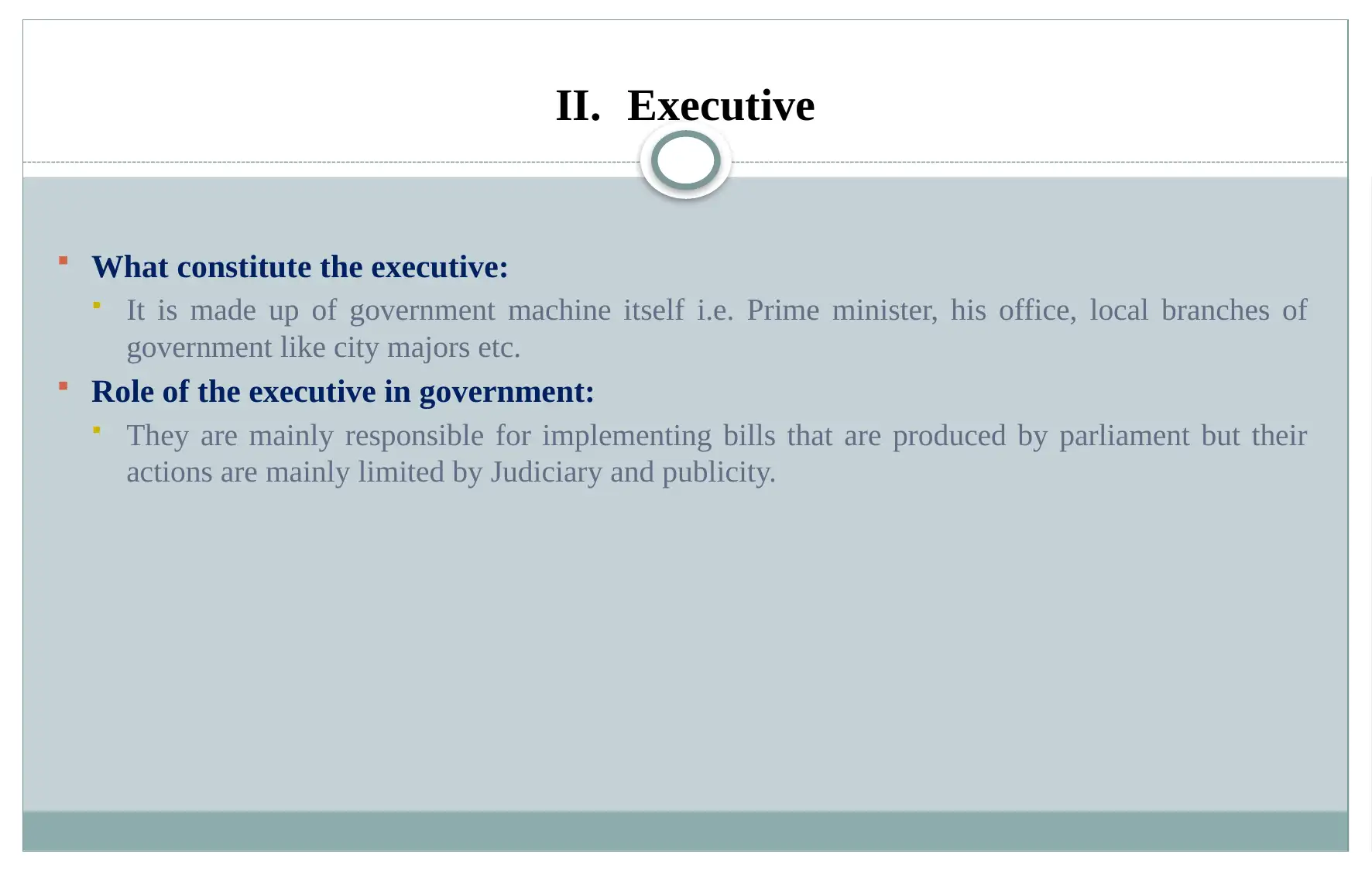
II. Executive
What constitute the executive:
It is made up of government machine itself i.e. Prime minister, his office, local branches of
government like city majors etc.
Role of the executive in government:
They are mainly responsible for implementing bills that are produced by parliament but their
actions are mainly limited by Judiciary and publicity.
What constitute the executive:
It is made up of government machine itself i.e. Prime minister, his office, local branches of
government like city majors etc.
Role of the executive in government:
They are mainly responsible for implementing bills that are produced by parliament but their
actions are mainly limited by Judiciary and publicity.
Paraphrase This Document
Need a fresh take? Get an instant paraphrase of this document with our AI Paraphraser
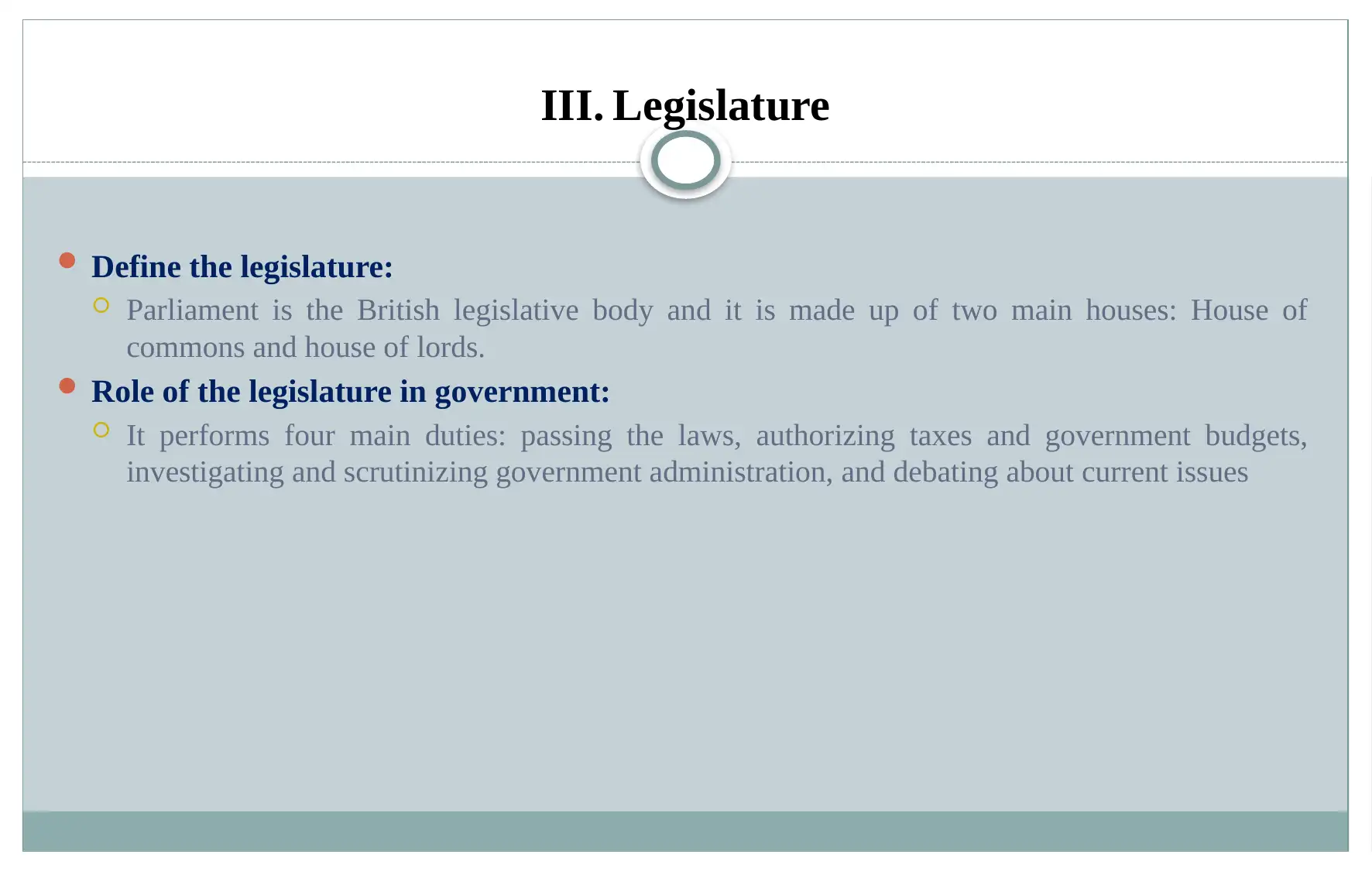
III. Legislature
Define the legislature:
Parliament is the British legislative body and it is made up of two main houses: House of
commons and house of lords.
Role of the legislature in government:
It performs four main duties: passing the laws, authorizing taxes and government budgets,
investigating and scrutinizing government administration, and debating about current issues
Define the legislature:
Parliament is the British legislative body and it is made up of two main houses: House of
commons and house of lords.
Role of the legislature in government:
It performs four main duties: passing the laws, authorizing taxes and government budgets,
investigating and scrutinizing government administration, and debating about current issues
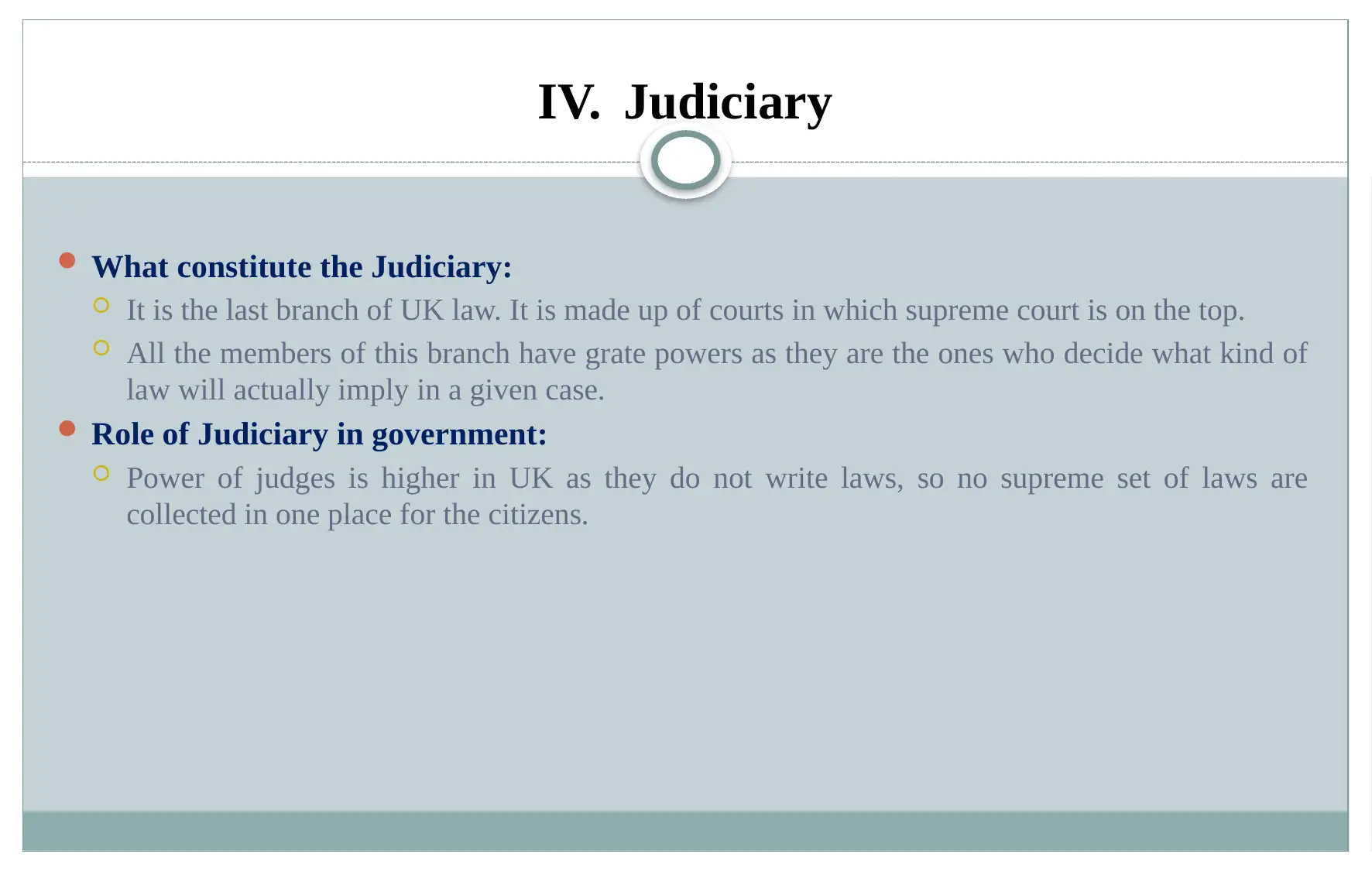
IV. Judiciary
What constitute the Judiciary:
It is the last branch of UK law. It is made up of courts in which supreme court is on the top.
All the members of this branch have grate powers as they are the ones who decide what kind of
law will actually imply in a given case.
Role of Judiciary in government:
Power of judges is higher in UK as they do not write laws, so no supreme set of laws are
collected in one place for the citizens.
What constitute the Judiciary:
It is the last branch of UK law. It is made up of courts in which supreme court is on the top.
All the members of this branch have grate powers as they are the ones who decide what kind of
law will actually imply in a given case.
Role of Judiciary in government:
Power of judges is higher in UK as they do not write laws, so no supreme set of laws are
collected in one place for the citizens.
⊘ This is a preview!⊘
Do you want full access?
Subscribe today to unlock all pages.

Trusted by 1+ million students worldwide
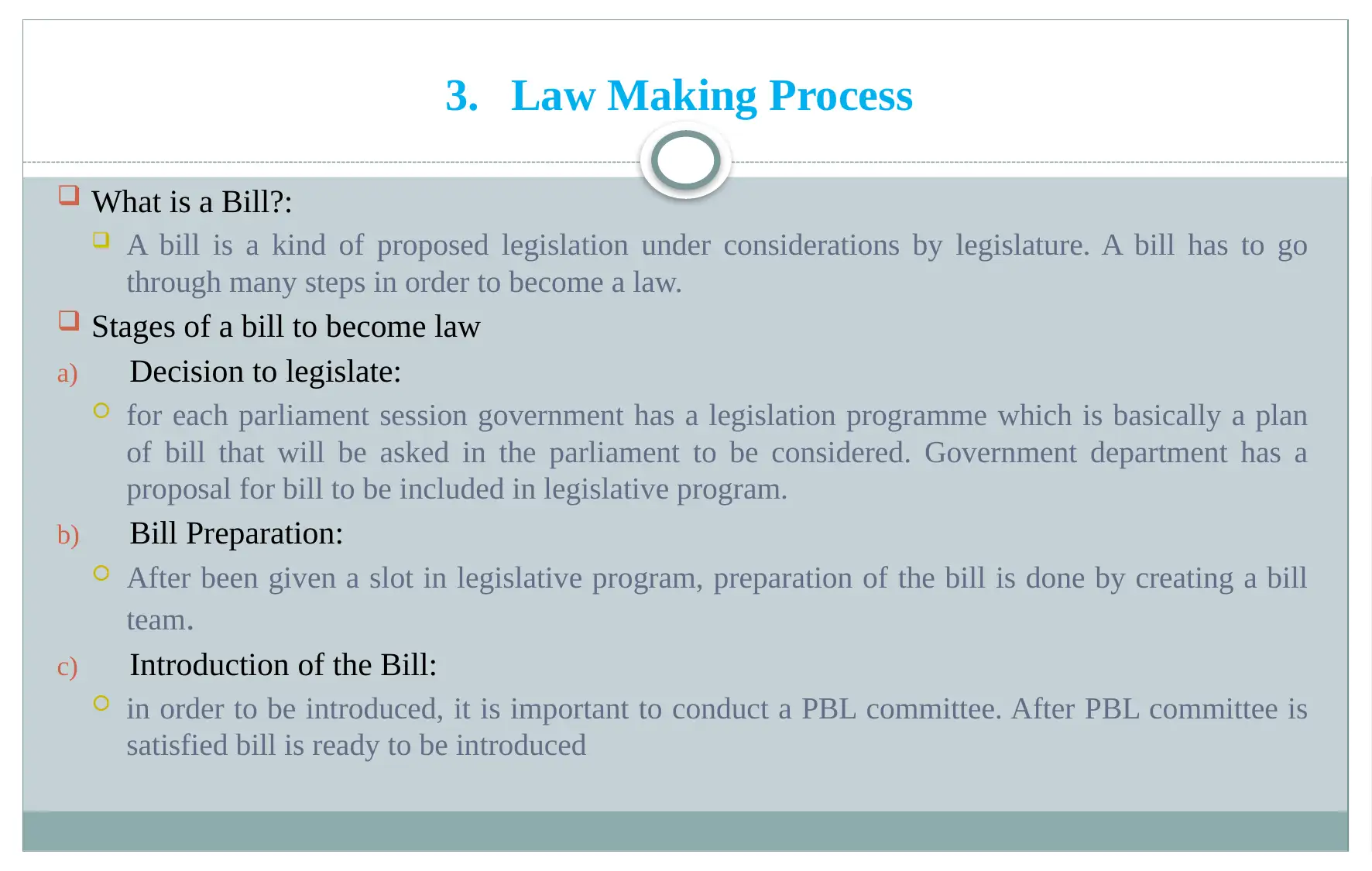
3. Law Making Process
What is a Bill?:
A bill is a kind of proposed legislation under considerations by legislature. A bill has to go
through many steps in order to become a law.
Stages of a bill to become law
a) Decision to legislate:
for each parliament session government has a legislation programme which is basically a plan
of bill that will be asked in the parliament to be considered. Government department has a
proposal for bill to be included in legislative program.
b) Bill Preparation:
After been given a slot in legislative program, preparation of the bill is done by creating a bill
team.
c) Introduction of the Bill:
in order to be introduced, it is important to conduct a PBL committee. After PBL committee is
satisfied bill is ready to be introduced
What is a Bill?:
A bill is a kind of proposed legislation under considerations by legislature. A bill has to go
through many steps in order to become a law.
Stages of a bill to become law
a) Decision to legislate:
for each parliament session government has a legislation programme which is basically a plan
of bill that will be asked in the parliament to be considered. Government department has a
proposal for bill to be included in legislative program.
b) Bill Preparation:
After been given a slot in legislative program, preparation of the bill is done by creating a bill
team.
c) Introduction of the Bill:
in order to be introduced, it is important to conduct a PBL committee. After PBL committee is
satisfied bill is ready to be introduced
Paraphrase This Document
Need a fresh take? Get an instant paraphrase of this document with our AI Paraphraser
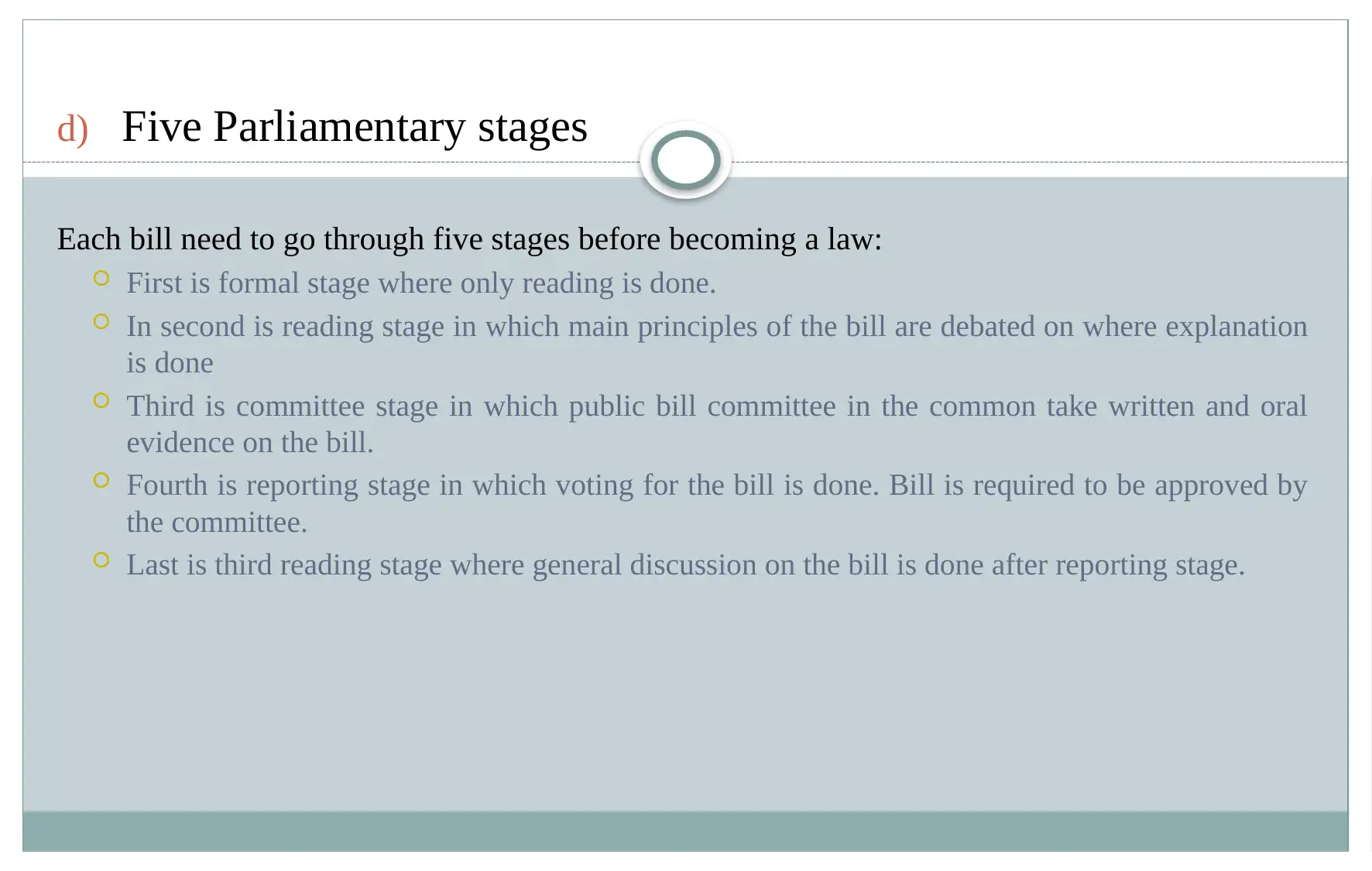
d) Five Parliamentary stages
Each bill need to go through five stages before becoming a law:
First is formal stage where only reading is done.
In second is reading stage in which main principles of the bill are debated on where explanation
is done
Third is committee stage in which public bill committee in the common take written and oral
evidence on the bill.
Fourth is reporting stage in which voting for the bill is done. Bill is required to be approved by
the committee.
Last is third reading stage where general discussion on the bill is done after reporting stage.
Each bill need to go through five stages before becoming a law:
First is formal stage where only reading is done.
In second is reading stage in which main principles of the bill are debated on where explanation
is done
Third is committee stage in which public bill committee in the common take written and oral
evidence on the bill.
Fourth is reporting stage in which voting for the bill is done. Bill is required to be approved by
the committee.
Last is third reading stage where general discussion on the bill is done after reporting stage.
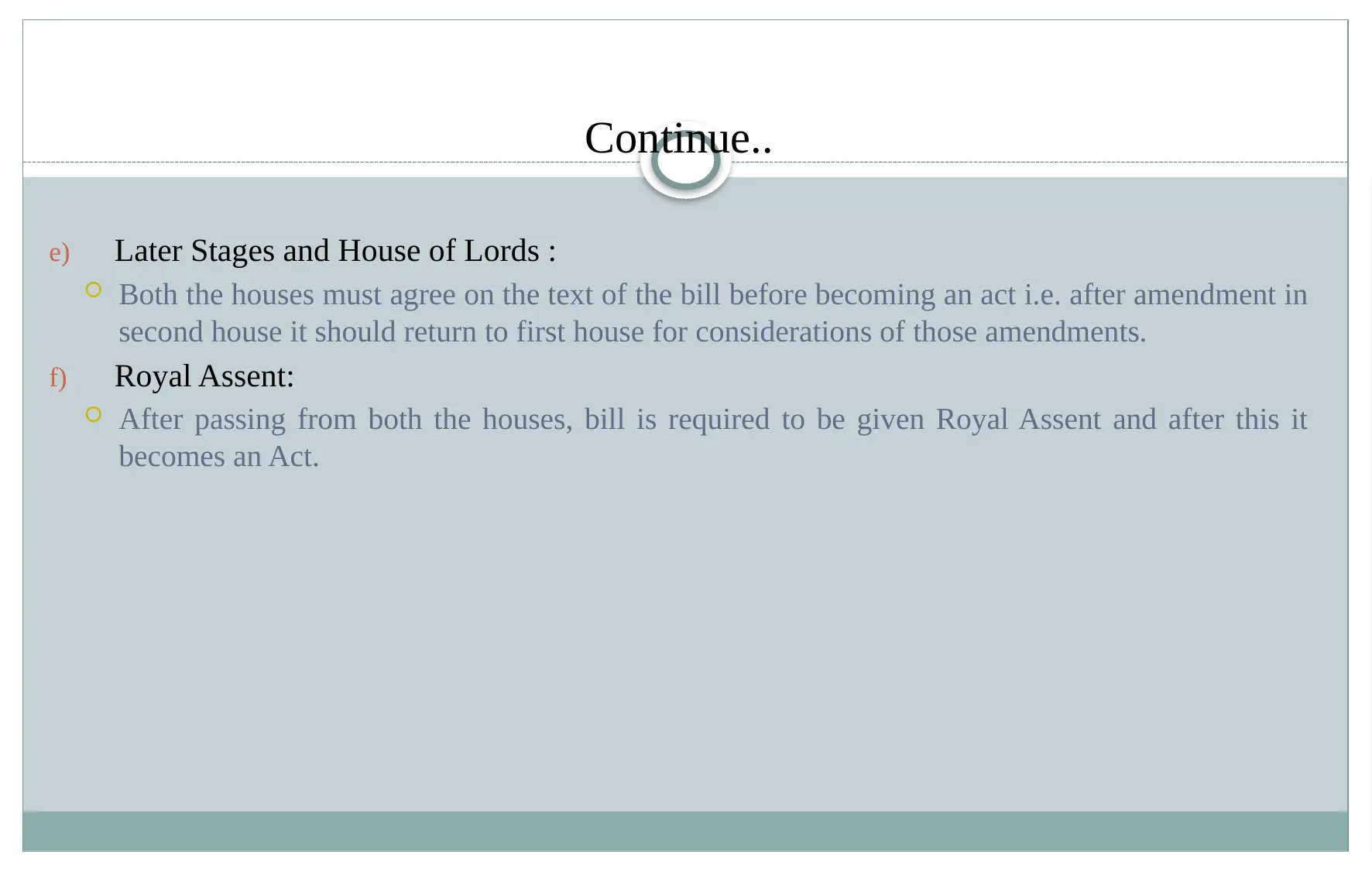
Continue..
e) Later Stages and House of Lords :
Both the houses must agree on the text of the bill before becoming an act i.e. after amendment in
second house it should return to first house for considerations of those amendments.
f) Royal Assent:
After passing from both the houses, bill is required to be given Royal Assent and after this it
becomes an Act.
e) Later Stages and House of Lords :
Both the houses must agree on the text of the bill before becoming an act i.e. after amendment in
second house it should return to first house for considerations of those amendments.
f) Royal Assent:
After passing from both the houses, bill is required to be given Royal Assent and after this it
becomes an Act.
⊘ This is a preview!⊘
Do you want full access?
Subscribe today to unlock all pages.

Trusted by 1+ million students worldwide
1 out of 14
Related Documents
Your All-in-One AI-Powered Toolkit for Academic Success.
+13062052269
info@desklib.com
Available 24*7 on WhatsApp / Email
![[object Object]](/_next/static/media/star-bottom.7253800d.svg)
Unlock your academic potential
Copyright © 2020–2026 A2Z Services. All Rights Reserved. Developed and managed by ZUCOL.





